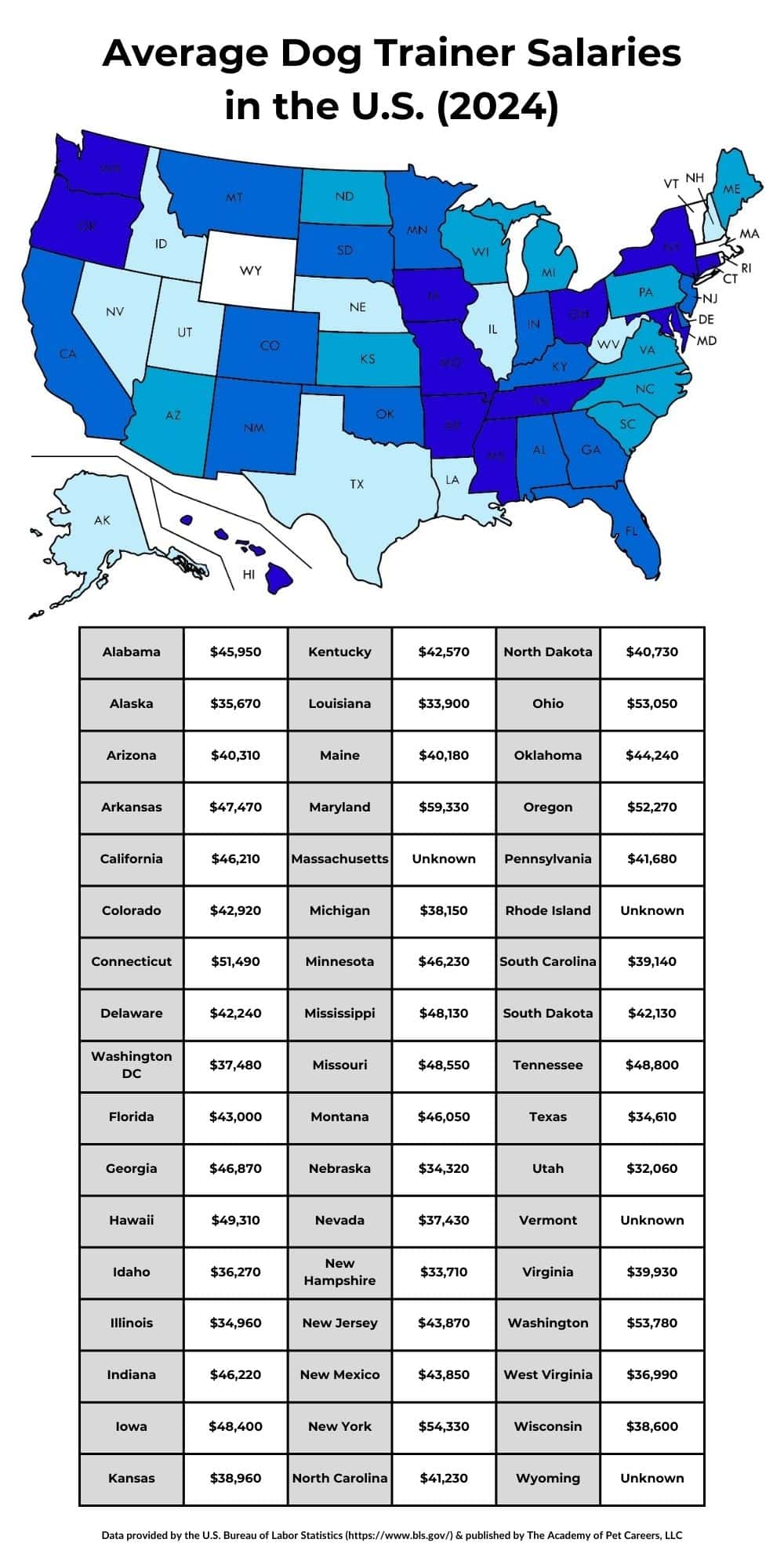Dog Trainer Salary: How Much Can You Earn in 2024?

Dog trainer salary is a topic of great interest for aspiring canine professionals. Understanding the earning potential in this rewarding field can provide valuable insights and motivation for those considering becoming a dog trainer.
It is important to note that dog trainer salaries may vary depending on the state in which you reside. This guide will help you understand the factors in how salaries are determined so you can make the most educated career decision.
The Average Dog Trainer’s Salary in the US by State
Depending on all these factors, your salary as a dog trainer can vary greatly. The average salary for US-based dog trainers according to the U.S. Bureau of Labor Statistics is $44,910 per year, but leadership roles in the industry can pay upwards of $60,000 - $70,000 per year. Self-employed dog trainers can make a similar amount depending on their experience and marketing skills.

How A Dog Trainer’s Pay Is Determined
There are several factors that go into how much you can make as a dog trainer, and your pay can vary throughout your career.
Employed Vs. Self-Employed
Most dog trainers either work for themselves or under another trainer. Those who work for themselves have the ability to earn more, but they take on more risk and responsibility than those who are employed by others. Dog trainers working in shelters and rescues usually make less than those working for private companies.
Your Specialization
Some types of training naturally pay more than others. Specialized trainers–like those for service dogs, protection dogs, and scentwork dogs–make more than general trainers. Trainers who do behavior modification work usually make more than those training for skills or “obedience.”
Your Education
The better your dog training education, the more you’re likely to make starting out, especially if you’re working for someone else. As a self-employed trainer, you might also want to pursue some sort of business education.
Your Experience
The more experience you have, the more earning potential you have. This is true whether you work for someone else or you’re self-employed.
Your Location
In large cities with higher costs of living, you can usually expect to earn more than you would in a less populated area.
Calculating Your Income As a Dog Trainer
Your income structure depends on whether you’re working for someone else or self-employed. If you’re working for someone else (like a shelter or larger training facility), you’ll almost certainly be paid an hourly wage.
If you run your own training business, however, your earnings will depend on how many dogs you train and how much you charge for your training packages.
For example, say you charge $60 per session and schedule 5 sessions per day. Your pay would be calculated like this:
$60 per session X 5 sessions per day = $300 per day
If you work 5 days a week and take 2 weeks of vacation every year, your annual earnings would look like…
$300 per day X 5 days per week X 50 working weeks per year = $75,000
Many dog trainers supplement their one-on-one training income with group classes. If you charged $15 per dog per class, taught 8 dogs per class, and offered 3 group classes per week, you could add this much to your income:
$15 per dog X 8 dogs per class X 3 classes per week = $360 per week
$360 per week X 50 working weeks per year = $18,000 per year
As a business owner, you’d also be responsible for paying for your business expenses. Luckily, those are usually incredibly low for independent trainers. You’d need to pay for insurance, treats and toys, and transportation to and from clients. If you’re teaching a group class, you might also need to rent a facility in case of inclement weather. But those expenses are relatively small compared to your earning potential.
 Author - Joseph Schifano
Author - Joseph Schifano
Joseph Schifano is the owner and President of The Academy of Pet Careers. With over 20 years of experience working in the pet field, managing large scale pet care businesses, he has experience in every facet of the industry. Joseph's focus is primarily on the business of pet care but his passion is in understanding animal behavior how a dog's brain works so we can improve the care we provide as pet professionals. He is a huge advocate for Pet Empowerment and Force Free training methods. Read more in Joseph's full bio.
